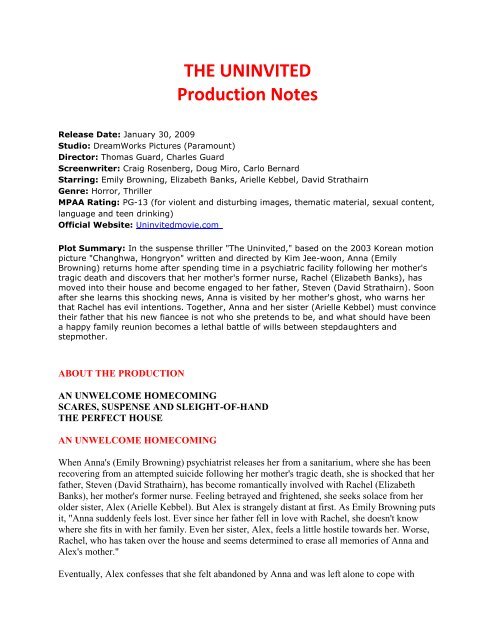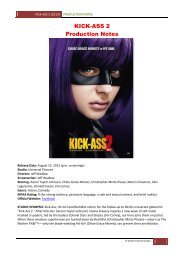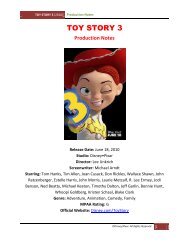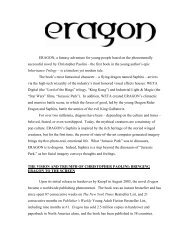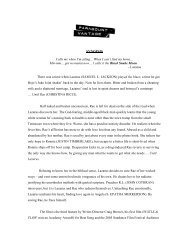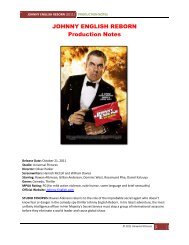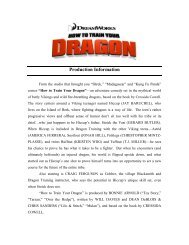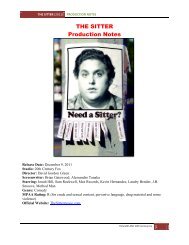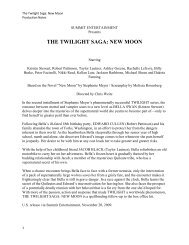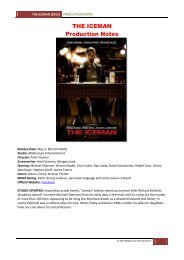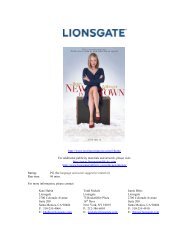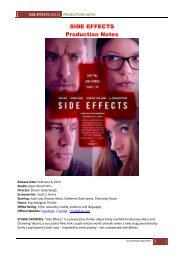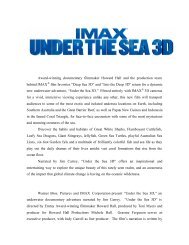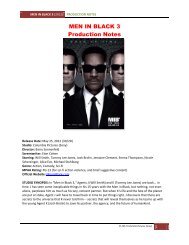THE UNINVITED Production Notes - Visual Hollywood
THE UNINVITED Production Notes - Visual Hollywood
THE UNINVITED Production Notes - Visual Hollywood
You also want an ePaper? Increase the reach of your titles
YUMPU automatically turns print PDFs into web optimized ePapers that Google loves.
<strong>THE</strong> <strong>UNINVITED</strong><br />
<strong>Production</strong> <strong>Notes</strong><br />
Release Date: January 30, 2009<br />
Studio: DreamWorks Pictures (Paramount)<br />
Director: Thomas Guard, Charles Guard<br />
Screenwriter: Craig Rosenberg, Doug Miro, Carlo Bernard<br />
Starring: Emily Browning, Elizabeth Banks, Arielle Kebbel, David Strathairn<br />
Genre: Horror, Thriller<br />
MPAA Rating: PG-13 (for violent and disturbing images, thematic material, sexual content,<br />
language and teen drinking)<br />
Official Website: Uninvitedmovie.com<br />
Plot Summary: In the suspense thriller "The Uninvited," based on the 2003 Korean motion<br />
picture "Changhwa, Hongryon" written and directed by Kim Jee-woon, Anna (Emily<br />
Browning) returns home after spending time in a psychiatric facility following her mother's<br />
tragic death and discovers that her mother's former nurse, Rachel (Elizabeth Banks), has<br />
moved into their house and become engaged to her father, Steven (David Strathairn). Soon<br />
after she learns this shocking news, Anna is visited by her mother's ghost, who warns her<br />
that Rachel has evil intentions. Together, Anna and her sister (Arielle Kebbel) must convince<br />
their father that his new fiancee is not who she pretends to be, and what should have been<br />
a happy family reunion becomes a lethal battle of wills between stepdaughters and<br />
stepmother.<br />
ABOUT <strong>THE</strong> PRODUCTION<br />
AN UNWELCOME HOMECOMING<br />
SCARES, SUSPENSE AND SLEIGHT-OF-HAND<br />
<strong>THE</strong> PERFECT HOUSE<br />
AN UNWELCOME HOMECOMING<br />
When Anna's (Emily Browning) psychiatrist releases her from a sanitarium, where she has been<br />
recovering from an attempted suicide following her mother's tragic death, she is shocked that her<br />
father, Steven (David Strathairn), has become romantically involved with Rachel (Elizabeth<br />
Banks), her mother's former nurse. Feeling betrayed and frightened, she seeks solace from her<br />
older sister, Alex (Arielle Kebbel). But Alex is strangely distant at first. As Emily Browning puts<br />
it, "Anna suddenly feels lost. Ever since her father fell in love with Rachel, she doesn't know<br />
where she fits in with her family. Even her sister, Alex, feels a little hostile towards her. Worse,<br />
Rachel, who has taken over the house and seems determined to erase all memories of Anna and<br />
Alex's mother."<br />
Eventually, Alex confesses that she felt abandoned by Anna and was left alone to cope with
Rachel. Says Arielle Kebbel, "Anna is trying to tell her how awful life was in the mental<br />
hospital, but Alex is saying that life at home was pretty terrible as well. It's interesting, because<br />
you can tell how happy Alex is to have Anna back, but she doesn't want to show it too much<br />
because she feels that she was deserted and left to deal with everything at home."<br />
"The fact that he's moved on so quickly from Mom devastates her," adds Kebbel. "So she keeps<br />
telling herself, 'I'm over it. I don't need Dad - or anyone else. I've already been hurt enough.'"<br />
Anna and Alex reconnect in their dislike for dad's new girlfriend, and given Steven's poor<br />
parenting skills, they feel totally abandoned. "My intention is to be a good father to her now,"<br />
observes David Strathairn, "but my career remains my top priority. Before, family matters were<br />
attended to by my wife. Now she's gone and I'm plagued with regret and guilt for not having<br />
been as involved in my children's lives as I should have. So I'm trying to catch up, not only as a<br />
dad but as a friend, as a confidante, as somebody who can support Anna. It's difficult, because I<br />
don't really know my daughter. I have expectations of what a father-daughter relationship should<br />
be, but I'm really not prepared to handle it all."<br />
Another barrier is his new relationship, which blossomed not long after his wife's death. "I want<br />
to marry Rachel," admits Strathairn. "I'm in love with her, because she brought me back from<br />
grief. But Anna can't see it that way because she's lost her mother and now this woman is trying<br />
to replace her. Anna is just not ready for that. On top of it, she's a teenager, a time in life that is<br />
already delicate and tricky."<br />
When Rachel tries to connect with Anna, the resentment turns to hate as Rachel tries to erase all<br />
traces of the family's past life. But, according to Elizabeth Banks, who plays Rachel, it isn't that<br />
clear-cut. "Rachel is very much in love with the idea of this family and of loving Steven,"<br />
explains Banks. "Rachel sees this as an opportunity at motherhood. She's been placed in this<br />
horrible position of being the classic stepmother, of having to stifle her happiness at being in<br />
love and having a family because Anna clearly thinks she's moving too fast. But from Rachel's<br />
perspective, all she wants is to help this family heal and be whole again.<br />
"Rachel's attraction to Steven comes from his gentleness," Banks continues. "She sees him as a<br />
wounded soul, someone who needs to be taken care of. And he is very sexy. He, in turn, treats<br />
Rachel with kindness and respects her intelligence. Rachel is an equal in his eyes, and that's what<br />
she's been looking for her whole life."<br />
Every loving moment between Rachel and Steven makes Anna feel more threatened. "It's one of<br />
the major relationships in the film, but we don't really say that much to each other," says<br />
Strathairn. "It's a pivotal relationship, yet most of it is conveyed with looks and touches, those<br />
in-between moments that truly cement a relationship."<br />
The chance of any bond ever existing between Anna and Rachel is officially crushed when the<br />
young girl begins having terrifying visions of her dead mother reaching out to her for help and<br />
suggesting that Rachel may have caused her death. Frightened and confused by the visions, and<br />
egged on by Alex's overt hostility toward Rachel, Anna becomes determined to assert her place<br />
in the house and protect her family.
Rachel, who is more experienced in the art of manipulation, would seem to have the upper hand.<br />
But Anna is not as fragile as her calm demeanor and delicate emotional state might at first<br />
suggest. "Anna is a worthy opponent," says Banks. "And Emily's approach to the role was very<br />
instinctual. Both Anna and Emily look very frail and sweet on the outside, but they're actually<br />
very determined underneath."<br />
That balance of vulnerability and strength in Anna is what attracted Browning to the role. "Anna<br />
could have so easily been the victim character," says Browning. "But that's not how she's written.<br />
She's not seeking sympathy. Even though she's fragile, there's a toughness to Anna that comes<br />
through despite the terrible things that have happened to her."<br />
As tensions escalate and Anna becomes convinced that Rachel was instrumental in her mother's<br />
death, she conspires with Alex to come up with proof of her deception - anything to convince her<br />
father he's made a terrible mistake.<br />
Later, when Alex tries to comfort her, it's as if the past year has slipped away and Alex has<br />
resumed the role of protective older sister. "When you have a younger sibling and you see they're<br />
in need," explains Kebbel, "you think, 'what can I do to fix this or help them?' The bond between<br />
Anna and me is so strong that it's heartbreaking. When you see all the compassion, love and trust<br />
they share, you begin to fully understand the scope of tragedy that has befallen this family."<br />
The closeness that the sisters enjoy is a significant plot point for both Browning and Kebbel.<br />
"The thing about sisters is you have an opportunity to share a bond that you don't have with<br />
anyone else," says Kebbel. "Emily and I really wanted to bring as much of that to the storyline of<br />
following two sisters, which meant that the scenes where we shared the intimate moments of<br />
laughing together, crying today and sleeping side by side were very important to us in telling the<br />
story."<br />
"Arielle Kebbel and I both used some similar slang," adds Browning. "The directors and the<br />
producers were really open to us adding our own touches, which were small, but meant so much<br />
to us."<br />
As Anna and Alex dig into Rachel's past, they discover some potentially disturbing and<br />
damaging details. Rachel doesn't deny any of it but makes it clear that Anna is treading in<br />
dangerous waters and warns her that she'd better be careful if she tries to come between Rachel<br />
and Steven.<br />
Determined to end the terror, Anna and Alex conspire to expose Rachel once and for all. But<br />
Rachel has her own ideas and the battle of wills between the two girls and their stepmother<br />
reaches a terrifying conclusion.<br />
SCARES, SUSPENSE AND SLEIGHT-OF-HAND<br />
In 2002, producers Walter F. Parkes and Laurie MacDonald produced the hit horror thriller, "The
Ring," a groundbreaking remake of the Japanese film "Ringu," that signaled the start of a new<br />
trend in genre films - the thought-provoking thriller. They would subsequently produce the film's<br />
successful sequel "The Ring Two," in 2005. Since first starting this new cycle of Asian horror<br />
film adaptations, Parkes and MacDonald searched for a project they felt was as ingeniously<br />
conceived and executed as "The Ring," and finally found it when producer Roy Lee brought the<br />
original Korean hit movie on which the "The Uninvited" is based to their attention. "It was a very<br />
intriguing story that had, at its heart, something that was ripe for translation," recalls Parkes.<br />
"The best of these movies are similar to fairy tales in that there is a strong moral undertone,<br />
which is a terrific foundation on which to build a horror tale. Look at 'The Omen,' in which<br />
Gregory Peck's child dies at birth and he steals another baby and doesn't tell his wife. The<br />
original Korean movie that inspired 'The Uninvited' also possesses an interesting and classically<br />
primal story of a teenager who, having spent ten months in a sanitarium after suffering a<br />
breakdown over the death of her mother, returns to discover that the woman who was taking care<br />
of her mother is now living with the father. There's a strong sense of moral transgression here.<br />
Teenagers, for all their rebelliousness, are very moral creatures. I have two teenage kids and they<br />
have a strong sense of family and its traditions. The sense of ownership of a collective past is<br />
very important and their morality comes from that. Something is unleashed in a teenager when a<br />
family promise has been broken."<br />
After securing the rights, Parkes and MacDonald began the process of what Parkes refers to as<br />
"translation." "I use the word 'translate' for a reason," insists Parkes. "It's not just mimicking; it's<br />
understanding what something means over there and turning it into what is meaningful here. Not<br />
just translating the language but also the context, the social environment, and how audiences here<br />
perceive stories, which is different than how Korean audiences do. Part of our job was to clarify<br />
the narrative substantially so that it was understandable but at the same time didn't lose that edge<br />
of ambiguity that makes Asian cinema so fascinating. We needed to understand what the values<br />
of these movies were within their culture and be as disciplined as possible in translating them<br />
into our own."<br />
For Parkes, "translation" also meant transposing the sensibility of the story to give it an almost<br />
classical look. "In <strong>Hollywood</strong>, horror has tended to dwell mostly in the world of low-budget<br />
films," explains Parkes. "But there was a time when all the best directors, actors and writers did<br />
horror movies: Robert Wise's 'The Haunting'; Roman Polanski's 'Rosemary's Baby'; William<br />
Friedkin's 'The Exorcist'; and Brian De Palma's 'Carrie.' That was followed by a period when<br />
horror became the stuff of slasher movies such as 'Nightmare on Elm Street' and 'Halloween.'<br />
Then, starting with films like 'The Sixth Sense,' horror returned to the mainstream. It certainly<br />
has brought us back to the kinds of movies that we enjoyed as kids. And it's attracting<br />
filmmakers for a specific reason: it's the only genre that elicits a high level of visceral, emotional<br />
and physical reaction from an audience. In the underlying material for 'The Uninvited,' we saw<br />
another opportunity to make this kind of horror film."<br />
"The Uninvited" finds inspiration in, and pays homage to, these classic horror films, reveals<br />
Parkes. "As in Hitchcock's 'Shadow of a Doubt,' there's a sense that a family member may have a<br />
past that's not exactly as presented. And, as in a more recent film like 'What Lies Beneath,'<br />
there's the sense that there's something wrong in what appears to be a beautiful environment.<br />
Much of 'The Uninvited' deals with memory and how we invest ourselves emotionally in the
places we grow up in. Every little nook seems to have a special meaning for Anna. And then, as<br />
we crossover into young adulthood, we look at everything from a different angle and start asking<br />
questions: what really happened during all those years?"<br />
Parkes and MacDonald then set about securing the right director - or in this case, directors. In the<br />
selection process, the Guard brothers, novice British filmmakers known for their commercial<br />
work, stood out despite their lack of feature experience. Parkes and MacDonald saw in them a<br />
talent similar to that of Gore Verbinski, who directed "The Ring." "It's unusual for commercial<br />
directors to have this strong sense of story," says Parkes. "Tom and Charlie Guard did a<br />
60-second spot for a French beer company and it contained an entire story: a beginning, middle,<br />
and end relationship, a sense of place, a sense of loss. I was very impressed with their work."<br />
Moreover, conversations with the brothers revealed that they were kindred spirits. "With Tom<br />
and Charlie, the first thing we saw was that they were real, fresh and stylish, almost classical in<br />
their approach," says Parkes. "That seemed appropriate for this movie because you don't want<br />
technique to get in the way of the story. But the thing that really clinched it for us was that they<br />
didn't talk about audience expectations. They didn't really talk about scares. They talked about<br />
Freud, about a case study of a young woman and how she would react to her father having an<br />
affair. The fact that they really got down to the emotional meaning made me feel confident that<br />
they would be sensitive to what is most important to us - the story. That Freud provided a context<br />
for what they wanted to do was impressive. I felt that we shared a common language."<br />
Charles Guard recalls that conversation. "We're drawn to scary material in a psychological sense.<br />
'Rosemary's Baby,' 'The Others,' 'The Sixth Sense' - they're psychological thrillers as well as<br />
horror films. The thing that attracted us to this project is that it blurred the boundaries between<br />
the genres, which we found exciting. Our taste has always been toward the more classic end of<br />
the spectrum."<br />
"We're very influenced by Asian terror," adds Tom Guard, "because it's all implied. A lot of it is<br />
in the characters' expressions and in the anticipation. Asian cinema is much freer with narrative<br />
than Western cinema. We thought the (translated) script was a really good fusion of the two<br />
because it had very strong Western-style story scenes but then it also had these gaps in between,<br />
which is where the terror lies. Those are the moments we really enjoyed because they were<br />
looser, more silent, they were about how people see things or think they have. So we hope<br />
there'll be a bridge between a Western sensibility and an Asian one in this film."<br />
Arielle Kebbel, who plays Alex and is a huge fan of the hit Korean film, says the Guard brothers<br />
have successfully captured the cinematic mastery of the original in their adaptation. "In the<br />
original film, I was captivated by the beautiful coloration because it made everything dramatic<br />
and fairy tale-like. did not have a sense of what was real and what wasn't, so I was forced to just<br />
go with it. I think that Charlie and Tom did such a great job of incorporating that mysterious<br />
feeling into this film because they were able to make a beautiful film that is still horrific to<br />
watch. It is not the gore that makes a scary story, it's what happens when real people are put in<br />
such dark circumstances that it forces them to do things they wouldn't normally do."<br />
Kebbel, of course, is part of the outstanding ensemble the film attracted, including David
Strathairn and Elizabeth Banks, neither of whom had appeared in this genre of film before. "A<br />
psychological thriller was not a genre I had ever participated in, so it was a curiosity to me," says<br />
Strathairn. "How do you tell this kind of story when the ultimate effect is contingent on<br />
deception and mystery and confusion about what's really going on? But then Tom and Charlie<br />
painted some pretty interesting scenarios about how they wanted to investigate this girl's journey<br />
through - what can you call it, post-traumatic stress? - and how it would affect all the other<br />
characters. It seemed like a very attractive story to tell."<br />
As for Banks, who plays Strathairn's love interest and is best known for her comedy work, she<br />
was attracted to the idea of finally playing the villainess, someone "a little edgier, whose<br />
sexuality is right out there - women like Rebecca De Mornay in 'The Hand That Rocks the<br />
Cradle,' Sharon Stone in 'Basic Instinct' or Glenn Close in 'Fatal Attraction.' They were great<br />
female villains. I just love all those films and those performances."<br />
Banks also confesses she has been a fan of Strathairn's since her days studying drama, and that<br />
heightened her interest in the project. "I met David a long time ago, when I was still a drama<br />
student. He did a reading of a friend's play in New York, and I thought it was so cool that this<br />
very astute, seasoned actor would read some young guy's play. Someone like David still has this<br />
opportunity to find a new audience around every corner, and this audience is going to love him.<br />
He's just great: serious and funny; he's got the chops."<br />
Banks' allusion to De Mornay is an apt one, claims co-star Kebbel. "Elizabeth nailed the role.<br />
After the table reading I thought, 'I will not be messing with her.' One of my all-time favorite<br />
scary movies is 'The Hand That Rocks the Cradle.' I watched it when I was a child and I've felt<br />
violated and scared by Rebecca De Mornay ever since. Elizabeth so reminded me of De Mornay;<br />
I couldn't believe what I had got myself into. My worst nightmare had come true," she laughs.<br />
"She did a great job."<br />
Despite the presence of such a strong ensemble, the casting of Anna proved to be the most<br />
crucial element. The strength of the story and its shattering ending hangs on the credibility of the<br />
actor playing the lead. The part went to Emily Browning in her first film since achieving fame in<br />
"Lemony Snicket's A Series of Unfortunate Events." "In casting this film, you have to start with<br />
Anna because it's through her eyes that we see the story," explains Parkes. "Laurie and I had<br />
produced 'Lemony Snicket,' which was Emily's film debut. And even then - I think she was close<br />
to turning 14 during filming - Emily had the rare qualities of some of our truly great film stars.<br />
First, you can watch her do nothing and be intrigued. There is some aspect of her that she keeps<br />
secret from you. Toward the end of the shoot of 'Lemony Snicket' we said to each other, 'This<br />
girl should be in a thriller.' Two and a half years later, when we first heard about the Korean<br />
movie and decided to purchase it, we already had Emily in mind. It was just one of those happy<br />
accidents where our knowledge of what she could do and the material were a perfect fit.<br />
"Emily has a timeless quality," Parkes continues. "She's someone you would find in the 1900s<br />
but she is also very contemporary. You can't really place her and that's very important in this<br />
genre; that sense of mystery is essential. We've met a lot of wonderful actresses who are full of<br />
contemporary culture, but that would pull you out of the story. It would pull you out of the<br />
character who has been separated for 10 months from everyday life."
Banks, who spent the better part of her role in scenes opposite Browning, concurs with Parkes.<br />
"Emily is fabulously gifted and professional and lovely to be around. And she's very witty, which<br />
I think is great in someone so young. I was very impressed."<br />
Despite all the accolades, Browning says she's just grateful to return to making movies with such<br />
a wonderful project. ""This is the first big American film I've done since 'Lemony Snicket' three<br />
years ago. I wanted to finish high school," explains Browning, "so I put the breaks on acting for<br />
awhile. I put a lot of thought into what my first film would be when I started acting again. There<br />
were a few things to choose from, but I loved this script because I didn't see the plot twist<br />
coming. That's really amazing because, usually, when you're reading a script, you can figure it<br />
out straight away. I was really surprised by the ending, which was really cool."<br />
The casting of Kebbel and Browning led to a fast friendship, despite an awkward start - which in<br />
many ways mirrors the progression of the story. "We first met at one of the auditions," recalls<br />
Browning. "I was jet-lagged and tired, so I was really quiet. Arielle was nervous and really<br />
loud."<br />
"At one point I was supposed to get really angry at my Dad and storm out of the room," interjects<br />
Kebbel, "but there wasn't a lot of space in the audition room. So instead of storming out, I<br />
slammed the wall. Emily jumped and later told her manager I was really scary."<br />
"Arielle Kebbel and I first met at one of the auditions," recalls Browning. "Arielle seemed<br />
nervous but also very energetic and confident. I was jet-lagged and tired, so I was really quiet.<br />
Arielle must have thought I was really shy. But then, when we met up in Vancouver, where we<br />
were filming, she invited me out for dinner and we couldn't stop talking, we were having so<br />
much fun. It's funny what jet-lag will do to you."<br />
This easy banter, constant interjections, and the habit of finishing each other's sentences mirrored<br />
the onscreen relationship between Anna and Alex. "Arielle and Emily brought such great energy<br />
to the set and to their characters," says Banks. "They had a great rapport. It was a really cool<br />
mixture. You totally believed that they were sisters."<br />
For Browning and Kebbel, working with the Guard brothers revealed an interesting parallel. "It<br />
was the tale of two brothers directing a movie," laughs Kebbel. "They have a total understanding<br />
of this story because they're brothers making a movie together about sibling bonds. They would<br />
finish each other's sentences the way Emily and I did, and the way that Anna and Alex would.<br />
"Theirs is a true partnership," concurs producer Walter Parkes. "And that was very easy for me<br />
because I'm in a partnership with my wife and, more often than not, I'm secretly counseled on<br />
just about everything. They are very much of one mind. I've never seen them squabble. There's a<br />
dynamic there that I think is extremely healthy.<br />
"And it was a pleasure to deal with directors who, because of their own relationship, knew how<br />
to collaborate. I've rarely felt more welcome behind the monitor, and I don't think it had anything<br />
to do with me and Laurie. I think that they are used to sharing their opinions because they share
so much with each other. It created a very open atmosphere on the set."<br />
Two sisters, two directors and, if that weren't enough to keep track of, two stories to be told. "It<br />
was fun and it was tough," says Browning of acting out the film's parallel stories without giving<br />
the game away. "There were so many times we had to be careful with the most minute details in<br />
the story that you wouldn't have to with a regular drama because we needed to make sure we<br />
weren't giving anything away. We had to keep secrets from the audience, but at the same time it<br />
had to make sense if they were to watch it again. The clues had to be there all along. It was really<br />
tricky."<br />
"It was making sure that whatever we were playing, someone could interpret it two ways," adds<br />
Banks. "Like when I'm carving the roast: the knife and the way I'm carving could seem very<br />
threatening to someone or I could just be carving a roast. It was about making things a little off<br />
so they could be interpreted two ways. Anna sees one thing but, through someone else's lens,<br />
they might see something completely different."<br />
"It was quite a complicated narrative, and to tell it effectively was a real challenge," concludes<br />
director Charles Guard. "So it was incredibly helpful to have such intelligent, brilliant actors.<br />
They really helped us get under the skin of the characters, and to explore the narrative as fully as<br />
we could."<br />
<strong>THE</strong> PERFECT HOUSE<br />
Most of "The Uninvited" was shot at one location, a stunning waterfront property on British<br />
Columbia's Bowen Island, a short ferry ride west from mainland Vancouver. "Eighty percent of<br />
the story takes place at the house, so we couldn't make the movie without the right one," says<br />
Parkes. "It couldn't have been more important. We scouted in Louisiana, an environment which<br />
is both beautiful and slightly threatening. We had two houses, which were terrible compromises,<br />
but both of them fell through. We had a difficult time finding anything that had both the<br />
connection to the story and the right logistical possibilities.<br />
"But then we were lucky to find in Canada a place that seemed as if it had been built for our<br />
movie," he continues. "It was perfectly evocative and suggestive of a family that is both<br />
welcoming and forbidding. The fact that the house was within 30 miles of Vancouver was a<br />
greater plus than the minus of having to get everyone on boats to get them over there; water taxis<br />
and ferries are a way of life up there. In fact, I don't remember ever having a more pleasant time<br />
on a location. Getting onto a boat and having a cup of coffee and then going up the little pier and<br />
the stairs we built, it focused us. We were isolated with one thing on our minds, which was<br />
making this movie. It was great."<br />
Well, most of the time. The isolation did have one drawback: last-minute changes could not<br />
always be accommodated. "There was a logistical concern," remembers production designer<br />
Andrew Menzies. "Cell phone reception was bad there, which was a hindrance to doing our job.<br />
But you also had to embrace that because there were always what we call fires on the set, where<br />
you needed something, emergencies, and if it just couldn't be done you had to work with what
you had. So, there was some creativity that came from limited choices."<br />
For their part, the directors didn't feel limited by the movie's location. By the time shooting had<br />
begun, notes Charles Guard, he and his brother had "been working on the project for more than a<br />
year, so we were pretty well prepared. Even when things changed at the last minute, we still had<br />
the benefit of all that preparation and were able to work around it."<br />
In addition, says Menzies, the location possessed a wonderfully eerie atmosphere during<br />
scouting. "When we first came here it was at the end of winter, and it had such mood because of<br />
the lower lighting. The clouds were off the coast and you couldn't see the mainland. It had this<br />
claustrophobic feeling because of the fog and the clouds and the storms coming in."<br />
For the interiors, however, "We wanted to create a romantic house, a feeling of warmth and<br />
history and tradition where a loving and nurtured family lived," he continues. "This would, we<br />
hoped, emphasize to the audience a feeling this was a close family unit now being violated by<br />
Rachael (Elizabeth Banks), this outside element."<br />
The seeming contradiction of atmosphere dovetailed perfectly with the parallel storylines. The<br />
first is the story of a wealthy, successful writer who has fallen in love again and is feeling<br />
optimistic after a terrible tragedy. He lives in a beautiful home with an atmospheric backdrop.<br />
But Anna's story is one of confusion and deception as she finds herself returning to a haunted<br />
house set in a foreboding landscape fraught with anxiety, secrets and danger. So the mixed<br />
weather of an unseasonably wet summer in Vancouver turned out to be almost perfect for<br />
everyone concerned.<br />
Almost perfect, yes, but not quite. The house, a multi-million dollar dream home built about six<br />
or seven years ago, was a little too new and stylish to suggest the older house of the story, with<br />
its history and potential for peril. "The owners have incredible taste," says Parkes, "so we had to<br />
take some of the chic away. Our production designer, Andy Menzies, and the whole art direction<br />
team were pretty crack; we had very strong set-decorating people to give the house its particular<br />
character. Things like the kitchen linoleum floor we put in.<br />
And there was a big, beautiful center island that any cook would want, that we took out in favor<br />
of something more rustic. We removed every stick of furniture and brought in our own. We put a<br />
rug on the stairs and then wore it down to suggest the kids have been tramping up and down<br />
them for the last 15 years. Small details are really important, particularly when you're working<br />
on a smaller canvas like this in which attention to detail can't be overemphasized."<br />
In addition, the open-plan design of the home lacked the necessary claustrophobia required for<br />
many of the scenes. Walls and doorways had to be added but pressure fitted in instead of nailed<br />
so as not to damage the home. "Because it's a new house and very expensive, we weren't allowed<br />
to do a whole lot. We couldn't do anything that we couldn't reverse," says Menzies. "But we did<br />
what we could at a superficial level to take the newness out of it."<br />
One item that did require more than just a superficial alteration, however, was the main stairwell.<br />
"This was a detail in our pre-production that exemplified why we made the right choice with the
Guard brothers," says Parkes. "Tom and Charlie said that one of the iconic images in horror<br />
movies are staircases; there's something about them that sticks in our minds. We had a great<br />
staircase but the banister had very thick pieces of wood with just little slats; we would have<br />
gotten a strobe effect when shooting through it. And the guys were, 'Well, we have the greatest<br />
location in the world; want to take down the banister?' So we did."<br />
They did it, fully prepared to restore it, in keeping with their desire to respect the architectural<br />
integrity of the house. "We created a new banister to accommodate certain shots," Parkes<br />
continues. "The directors were right: it became a really important part of the filmmaking. I really<br />
admired these two guys who, considering this was their first movie, were that specific about the<br />
needs of the genre and pushed for something like this."<br />
Luckily, says Andrew Menzies, the home's owner "has had film crews in here before; he knew<br />
that wear and tear would occur and that it could be repaired. We had his builder come in when<br />
we tore out the spindles on the stairs, which was a major deal; and we arranged for him to redo<br />
the stairs when we left, so the owner would have exactly the same house when he returned."<br />
Crucially, the house lacked one very important element - a boathouse. With no suitable<br />
properties anywhere that contained one, the producers decided to build one from scratch. It was a<br />
beautiful addition to the property, designed to blend in as if it was part of the original design; any<br />
homeowner would have been delighted to see it stay. But that was not to be, since the story<br />
called for its destruction as Anna's memory flashes back to the tragic night of the fire. The<br />
shooting of the fiery explosion met everyone's expectations, the flames bathing the darkened lake<br />
below with a fiery orange. "It was a great moment," exclaims Parkes.<br />
Whether audiences pick up on the visual clues in the set design the first time they see the film is<br />
not important, because repeated viewings offer insights into how the film was constructed and<br />
how it is going to end. "It's very complicated," says Parkes, "because, in a way, every scene is<br />
two scenes. There is the scene the audience is watching, which has to have its own emotional<br />
reality, which has to be legitimate and appear to be moving the story toward what the audience is<br />
absolutely sure is the goal of the movie; but then it has to be this other scene, which is what's<br />
really going on. And if we did our job right, both realities will exist in every moment of the<br />
movie."<br />
CAST INFO<br />
EMILY BROWNING (Anna)<br />
ELIZABETH BANKS (Rachel)<br />
ARIELLE KEBBEL (Alex)<br />
DAVID STRATHAIRN (Steven)<br />
ABOUT <strong>THE</strong> CAST<br />
EMILY BROWNING (Anna) is best known for her role as Violet in "Lemony Snicket's A<br />
Series of Unfortunate Events," which brought her worldwide acclaim and an Australian Film<br />
Institute International Award. Prior to "Lemony Snicket," Browning starred in a number of
Australian films, TV shows and TV miniseries, most notably the 2001 television movie "Halifax<br />
f.p: Playing God," for which she won the Australian Film Institute's Young Actor's Award.<br />
Browning's other film credits include "Ghost Ship" opposite Gabriel Byrne and Julianna<br />
Margulies; "The Man Who Sued God" opposite Billy Connolly and Judy Davis; "Ned Kelly"<br />
opposite Heath Ledger, Orlando Bloom, Geoffrey Rush and Naomi Watts; and the acclaimed<br />
miniseries "After the Deluge" opposite Hugo Weaving, David Wenham, and Rachel Griffiths.<br />
Browning made her debut opposite Judy Davis in the 1998 Hallmark Hall of Fame drama "The<br />
Echo of Thunder" directed by Simon Wincer.<br />
ELIZABETH BANKS (Rachel) had a breakout role as Jeff Bridges' wife in Gary Ross'<br />
inspiring true-story drama "Seabiscuit," for which she took home a SAG nomination. The 2003<br />
Young <strong>Hollywood</strong>'s Exciting New Face winner had remarkable parts in movies such as "Catch<br />
Me If You Can" (with Leonardo DiCaprio), "Heights" (opposite Glenn Close) and the hit "The<br />
40-Year-Old Virgin" (starring Steve Carell) before shining on her own as slime-drenched Starla<br />
Grant in the sci-fi horror flick "Slither." Banks is also well-remembered as Betty Brant in the<br />
highly successful "Spider-Man" franchise.<br />
Other recent credits include Disney's "Invincible" starring Mark Wahlberg; "Bill" with Jessica<br />
Alba; and "Fred Claus" opposite Vince Vaughn and Paul Giamatti. In addition to "The<br />
Uninvited," Banks' other recent releases include "Definitely, Maybe," "Meet Dave," "W.," "Zack<br />
and Miri Make a Porno" and "Role Models."<br />
ARIELLE KEBBEL (Alex) first made waves when she booked a recurring role on the beloved<br />
WB hit "Gilmore Girls," playing the girlfriend-turned-wife of resident hunk Jared Padalecki. She<br />
later starred in "John Tucker Must Die" and "Aquamarine," both for Fox, then in Sony's "The<br />
Grudge 2." Other projects include a lead role in Universal's "American Pie Presents Band Camp"<br />
and a celebrity cameo in "The Kid and I." Upcoming films for Kebbel are "Red Mist" and<br />
"Mardi Gras."<br />
Kebbel is also a regular in indie films, with lead roles in "Day Dreamer" for director Brahman<br />
Turner, as well as "The Outlaw Trail" and "Forever Strong" for director Ryan Little. She also<br />
made a return to the small screen to guest-star opposite James Woods and Sarah Carter on the hit<br />
CBS series "Shark."<br />
On television, Kebbel also had a recurring role on the WB's "Grounded for Life," and has done<br />
guest-star turns on many popular television shows, including "CSI: Crime Scene Investigation,"<br />
"CSI: Miami," "Entourage" and "Law & Order: Special Victims Unit."<br />
DAVID STRATHAIRN (Steven) won the Volpi Cup at the Venice Film Festival and earned<br />
nominations for the Academy Award®, Golden Globe, Screen Actors Guild Award, BAFTA<br />
Award and Independent Spirit Award for his compelling portrait of legendary CBS news<br />
broadcaster Edward R. Murrow in George Clooney's 2005 Oscar®-nominated drama "Good
Night, and Good Luck." He was most recently seen in "The Spiderwick Chronicles" and "The<br />
Bourne Ultimatum."<br />
His 2005 Independent Spirit Award nomination was the fourth in a stellar career that dates back<br />
to his 1980 motion picture debut in John Sayles' first film, "The Return of the Secaucus Seven."<br />
Strathairn subsequently collaborated with Sayles on seven titles, winning the IFP honor for his<br />
supporting performance in "City of Hope," while collecting two additional nominations for<br />
"Passion Fish" and "Limbo."<br />
Strathairn's early screen efforts included supporting roles in Mike Nichols' "Silkwood," Fred<br />
Schepisi's "Iceman," James Foley's "At Close Range" and Robert M. Young's "Dominick and<br />
Eugene," as well as Sayles' acclaimed dramas "Matewan" and "Eight Men Out" and his 1984<br />
satire "The Brother from Another Planet."<br />
Turning the decade, Strathairn continued a busy screen career with co-starring roles in several<br />
critically acclaimed films, including Tim Robbins' directorial debut, "Bob Roberts"; Penny<br />
Marshall's "A League of Their Own"; "Losing Isaiah"; Sydney Pollack's "The Firm"; "Sneakers";<br />
Taylor Hackford's adaptation of the Stephen King novel Dolores Claiborne; and Jodie Foster's<br />
"Home for the Holidays," as well as two projects with Curtis Hanson, "The River Wild" and the<br />
Oscar®-winning "L.A. Confidential," in which Strathairn shared a Screen Actors Guild Award<br />
nomination with the all-star ensemble cast. His additional movie credits include "Memphis<br />
Belle," "A Map of the World," "Simon Birch," "Lost in Yonkers," "Missing in America,"<br />
Michael Hoffman's adaptation of "A Midsummer Night's Dream," Philip Kaufman's "Twisted"<br />
and "The Notorious Bettie Page."<br />
Strathairn has also maintained a high profile in the theatrical world, with roles at such venues as<br />
the Manhattan Theatre Club, the New York Shakespeare Festival, SoHo Rep, the Hartford Stage<br />
Company, Ensemble Studio Theatre and Seattle Repertory.<br />
CREW INFO<br />
<strong>THE</strong> GUARD BRO<strong>THE</strong>RS (Directors)<br />
CRAIG ROSENBERG (Screenplay)<br />
DOUG MIRO & CARLO BERNARD (Screenplay)<br />
WALTER F. PARKES & LAURIE MACDONALD (Producers)<br />
ROY LEE (Producer)<br />
MICHAEL GRILLO (Executive Producer)<br />
DOUG DAVISON (Executive Producer)<br />
IVAN REITMAN (Executive Producer)<br />
TOM POLLOCK (Executive Producer)<br />
DANIEL LANDIN (Director of Photography)<br />
ANDREW MENZIES (<strong>Production</strong> Designer)<br />
CHRISTIAN WAGNER (Editor)<br />
JIM PAGE (Editor)<br />
TRISH KEATING (Costume Designer)
CASEY GRANT (Co-Producer)<br />
CHRISTOPHER YOUNG (Music)<br />
ABOUT <strong>THE</strong> FILMMAKERS<br />
<strong>THE</strong> GUARD BRO<strong>THE</strong>RS (Directors) make their feature film debut with "The Uninvited,"<br />
following up their award-winning series of short films starring Lena Headley about chance<br />
encounters in London. "Inside Out," is the story of a market researcher who falls in love with a<br />
window dresser and won Best British short at the BBC Short Film Festival. "Round About Five,"<br />
a dialogue-free study of the minutiae of human attraction, completed the series and was<br />
showcased by Kodak at the Cannes Film Festival.<br />
CRAIG ROSENBERG (Screenplay) is an Australian-born screenwriter/director who has<br />
written numerous screenplays for all the major studios, as well as directors such as Steven<br />
Spielberg and Wes Craven, and award-winning producers, including Art Linson and Neal<br />
Moritz.<br />
Among his credits, Rosenberg wrote and directed "Hotel de Love" for Village Roadshow<br />
Pictures/Live Entertainment about twin brothers who run into a childhood sweetheart at a<br />
honeymoon hotel and compete for her affection.<br />
Rosenberg also shared screenplay credit with Paul Zybyseski for New Line Cinema's "After the<br />
Sunset" directed by Brett Ratner. Shot in the Bahamas, the action-romance involved the heist of<br />
a rare diamond being exhibited on a luxury liner and starred Pierce Brosnan, Salma Hayek and<br />
Woody Harrelson. In 2006, Rosenberg wrote and directed "Half Light" starring Demi Moore as<br />
Rachel Carlson, a successful novelist who moves to a small Scottish village in hopes of moving<br />
on with her life after the death of her son, but is instead haunted by the ghosts of her past.<br />
In television, Rosenberg has sold several pilots (including to Fox and ABC), and was on the<br />
writing staff of the hit show "Lost" (ABC/Touchstone).<br />
DOUG MIRO & CARLO BERNARD (Screenplay) grew up together in suburban Detroit and<br />
have known each other since they were eight years old. They wrote "The Great Raid" for<br />
Miramax, which was released in 2005, and recently worked on the upcoming "Prince of Persia"<br />
for Jerry Bruckheimer and Disney.<br />
WALTER F. PARKES & LAURIE MACDONALD (Producers) are two of the most active<br />
motion picture producers working in <strong>Hollywood</strong> today. Films produced or executive produced<br />
by the duo include the "Men in Black" series, "The Ring" films, "Catch Me If You Can,"<br />
"Gladiator," "Minority Report," "Awakenings," "Amistad," "Lemony Snicket's A Series of<br />
Unfortunate Events" and "Sweeney Todd: The Demon Barber of Fleet Street." They have<br />
collaborated as producers with director Steven Spielberg on four films: "Amistad," "Minority<br />
Report," "Catch Me If You Can" and "The Terminal." Last year, Parkes and MacDonald
produced "The Lookout," the directing debut of screenwriter Scott Frank. The team's most recent<br />
release was "The Kite Runner" based on Khaled Hosseini's acclaimed novel and directed by<br />
Marc Forster.<br />
In addition to their producing work, Parkes and MacDonald served as the co-heads of<br />
DreamWorks Pictures from the inception of the studio until mid-2005. They were responsible for<br />
the development and production of the company's diverse slate of films, which achieved both<br />
box office success and critical acclaim, including - for only the second time in the history of the<br />
Academy of Motion Picture Arts and Sciences - three consecutive Best Picture Oscar® winners:<br />
"American Beauty," "Gladiator" and "A Beautiful Mind," the latter two produced in partnership<br />
with Universal. Other critical and commercial successes produced during their tenure include:<br />
Cameron Crowe's "Almost Famous," Robert Zemeckis' "What Lies Beneath," Adam McKay's<br />
"Anchorman: The Legend of Ron Burgundy," Michael Mann's "Collateral" and Steven<br />
Spielberg's Academy Award® and Golden Globe-winning drama "Saving Private Ryan," which<br />
was the top-grossing film domestically of 1998.<br />
MacDonald began her producing career as a documentary and news producer at KRON, the<br />
NBC affiliate in San Francisco. She later joined Columbia Pictures, where she served as a Vice<br />
President of <strong>Production</strong>. After four years, she started a production company with Walter Parkes.<br />
Immediately prior to joining DreamWorks, MacDonald oversaw development and production at<br />
Amblin Entertainment.<br />
Parkes is a three-time Academy Award® nominee, earning his first nomination as the<br />
director/producer of the 1978 documentary "California Reich," which exposed neo-Nazi<br />
activities in California. He garnered his second Oscar® nomination for writing (with Lawrence<br />
Lasker) the original screenplay for "WarGames," and his third nod for his work as a producer on<br />
the Best Picture nominee "Awakenings." Parkes also co-wrote and produced the thriller<br />
"Sneakers" starring Robert Redford and Sidney Poitier.<br />
Parkes and MacDonald are involved in a wide range of non-profit activities, including positions<br />
on the boards of the Para Los Ninos Charter School, which provides services for children of the<br />
immigrant working community of downtown Los Angeles; the Starbright Foundation, which<br />
develops and provides products for chronically sick children; and the Venice Family Clinic, the<br />
largest free provider of health services in the nation. Parkes is also the President of the<br />
University Council of Yale University.<br />
ROY LEE (Producer) earned his first motion picture-producing credit as Executive Producer<br />
on Gore Verbinski's 2002 blockbuster "The Ring." Lee went on to produce the 2004 haunted<br />
house horror "The Grudge" based on the 2000 Japanese film "Ju-On" directed by Takashi<br />
Shimizu. "The Grudge" currently holds the record for the biggest opening weekend of all time<br />
for a horror film. "The Grudge 2," released in 2006, starring Amber Tamblyn and Sarah Michelle<br />
Gellar and directed by Takashi Shimizu, topped the box office at $22 million in its opening<br />
weekend. October 2006 also saw the release of "The Departed," a crime thriller at Warner Bros.<br />
directed by Martin Scorsese and starring Jack Nicholson, Matt Damon and Leonardo DiCaprio;<br />
the film grossed $27 million in its opening weekend, making it Scorsese's biggest opening ever.
The film went on to win four Academy Awards®, including Best Picture, Best Director and Best<br />
Adapted Screenplay.<br />
As an independent producer, Lee began importing films from Japan, Korea, Hong Kong and the<br />
Philippines to be remade in the United States. Together with partner Doug Davison, Lee founded<br />
Vertigo Entertainment in 2001, where the pair recently produced "The Strangers" (a suspense<br />
thriller starring Liv Tyler and Scott Speedman and directed by Bryan Bertino), "Assassination of<br />
a High School President" (a noir teen comedy starring Bruce Willis, Mischa Barton and Reece<br />
Thompson and directed by Brett Simon), a remake of the supernatural thriller "The Eye"<br />
(starring Jessica Alba and directed by David Moreau and Xavier Palud), and "Shutter" (a horror<br />
thriller starring Rachael Taylor and Joshua Jackson and directed by Masayuki Ochiai). Vertigo is<br />
also in various stages of production and development on a multitude of projects, including<br />
"Confessions of Pain" (a crime thriller to be written by William Monahan and starring Leonardo<br />
DiCaprio), "REC" (a horror thriller to be written and directed by John Erick Dowdle and Drew<br />
Dowdle), "Old Boy," and a remake (written by Vlas and Charles Parlapanides) of the hit<br />
Japanese franchise "Death Note."<br />
MICHAEL GRILLO (Executive Producer) has worked his way up through the production<br />
ranks over many years, starting as DGA trainee on "Young Frankenstein" and "The Towering<br />
Inferno," then becoming assistant director on "New York, New York," "The Deerhunter,"<br />
"Breaking Away," "Heaven's Gate," "Body Heat" and "The Big Chill." He worked with director<br />
Lawrence Kasdan as executive producer on "Silverado," "I Love You to Death" and "Wyatt<br />
Earp" and as producer on "Grand Canyon" and "The Accidental Tourist," for which he received<br />
an Academy Award® nomination for Best Picture. Later, he produced the Albert Brooks comedy<br />
"Defending Your Life" and "The Trigger Effect" written and directed by David Koepp. When<br />
DreamWorks Studios was formed, Grillo became the head of feature film production<br />
management. He held that position from 1996 thru 2006 and was executive producer on<br />
DreamWorks' first feature film "The Peacemaker." He oversaw production on such diverse films<br />
as "Anchorman," "The Ring," "Castaway," "Gladiator," "American Beauty" and "Saving Private<br />
Ryan."<br />
Grillo is a member of the Academy of Motion Pictures Arts and Sciences and the Directors Guild<br />
of America.<br />
Along with Roy Lee, his partner in Vertigo Entertainment, DOUG DAVISON (Executive<br />
Producer) was behind the wildly successful thrillers "The Ring" (adapted from Hideo Nakata's<br />
popular 1998 Japanese fright film) and "The Grudge." His other films include Martin Scorsese's<br />
Oscar®-winning crime thriller "The Departed" starring Leonardo DiCaprio, Jack Nicholson and<br />
Matt Damon; and the box office hit "The Strangers" starring Liv Tyler.<br />
Davison produced another Japanese horror adaptation, "Dark Water," based on the Koji Suzuki<br />
novel, directed by Walter Salles and starring Jennifer Connelly. Davison then oversaw the<br />
release of "The Lake House," a Warner Bros. romance starring Keanu Reeves and Sandra<br />
Bullock.
Vertigo's recent releases include "Assassination of a High School President," a noir teen comedy<br />
directed by Brett Simon and starring Bruce Willis and Mischa Barton; "Quarantine," a horror<br />
thriller directed by John Dowdle and starring Jennifer Carpenter and Jay Hernandez; and<br />
"Possession," a psychological thriller directed by Joel Bergvall and Simon Sandquist, and<br />
starring Sarah Michelle Gellar and Lee Pace.<br />
Vertigo is also in various stages of development and production on a number of projects,<br />
including "Night of the Living Dorks" (a horror comedy written by Chris Bishop); "The Brigands<br />
of Rattleborge" (a revenge western written by Craig Zahler); and "Since Walker Left" (a family<br />
drama to be directed by Keith Gordon and to star Julianne Moore, Bryce Dallas Howard and<br />
Vanessa Redgrave).<br />
Davison began his film career in New York City, first as a set production assistant on "Die Hard:<br />
With a Vengeance," then as a script reader at New Line Cinema. Upon relocating to Los<br />
Angeles, Davison landed at Mad Chance <strong>Production</strong>s where, under the tutelage of Andrew<br />
Lazar, he worked as the company's director of development before becoming president of<br />
production, co-producing "Death to Smoochy" written by Adam Resnick, directed by Danny<br />
DeVito and starring Robin Williams and Edward Norton. While at Mad Chance, Davison also<br />
developed such projects as "Space Cowboys," "Cats and Dogs" and "Confessions of a Dangerous<br />
Mind."<br />
Director/Producer IVAN REITMAN (Executive Producer) has been the creative force behind<br />
films beloved by audiences around the world. From raucous comedies like "Animal House,"<br />
"Stripes" and "Ghostbusters," to more sophisticated delights like "Dave," "6 Days/7 Nights" and<br />
"Twins."<br />
The career that has brought about so many laughs began in Canada, where his family emigrated<br />
from Czechoslovakia when he was four years old. Reitman studied music at McMaster<br />
University, but soon turned his talents to film and theater.<br />
Shortly after graduation, Reitman delved into film production - first with the extremely<br />
low-budget horror comedy "Cannibal Girls" starring Canada's Eugene Levy and Andrea Martin,<br />
followed by the live television show "Greed" with Dan Aykroyd as its announcer. Reitman then<br />
headed to New York City and produced the Broadway hit "The Magic Show" starring McMaster<br />
friend Doug Henning. He continued producing for the stage with the Off-Broadway hit "The<br />
National Lampoon Show," where he brought together for the first time the then-unknown John<br />
Belushi, Gilda Radner, Bill Murray, Harold Ramis and Joe Flaherty. Reitman returned to<br />
Broadway to produce and direct the musical "Merlin," earning him Tony nominations for<br />
directing and producing. While in New York, Reitman reapplied his talents to filmmaking when<br />
he joined forces with National Lampoon and brought us the groundbreaking sensation "Animal<br />
House."<br />
Following the success of that film, Reitman returned home to Canada to direct "Meatballs," still<br />
considered one the most successful films ever made in Canada.
The string of hits continued with "Stripes" and the "Ghostbusters" series, which teamed Bill<br />
Murray with Dan Aykroyd and Harold Ramis; "Dave" starring Kevin Kline and Sigourney<br />
Weaver; "Legal Eagles" starring Robert Redford and Debra Winger; "6 Days/ 7 Nights" with<br />
Harrison Ford and Anne Heche; "Evolution" starring David Duchovny and Julianne Moore; and<br />
a series of films that revealed an untapped comic persona for action hero Arnold<br />
Schwarzenegger: "Twins," "Junior" (both co-starring Danny DeVito) and "Kindergarten Cop."<br />
Reitman's list of producing credits is equally extensive. He produced the family features<br />
"Beethoven" and "Beethoven's 2nd"as well as the HBO telefilm "The Late Shift," which received<br />
seven Emmy nominations. Other producing endeavors include "Heavy Metal," Howard Stern's<br />
"Private Parts," the animation/live action film "Space Jam," which teamed Michael Jordan with<br />
the Looney Toons characters; and the teen comedy hits "Road Trip," "Eurotrip" and "Old<br />
School" starring Will Ferrell, Vince Vaughn and Luke Wilson.<br />
In 1984, Reitman was honored as Director of the Year by the National Association of Theater<br />
Owners and the next year received a Special Achievement Award at the Canadian Genie awards.<br />
In 1979, and again in 1989, for the films "Animal House" and "Twins," Reitman was honored<br />
with the People's Choice Award. In November of 1994, Reitman became the third director<br />
honored by Variety magazine in a special "Billion Dollar Director" issue. At the end of 2000,<br />
Reitman's films "Animal House" and "Ghostbusters" were honored as two of this past century's<br />
funniest movies by the American Film Institute. He currently heads The Montecito Picture<br />
Company, a film and television production company with partner Tom Pollock, in association<br />
with DreamWorks, SKG.<br />
Reitman also directed "My Super Ex-Girlfriend" and is the executive producer of the smash<br />
Canadian comedy "The Big Dirty" starring the comedy troupe Trailer Park Boys. He was also<br />
the executive producer on the DreamWork's thriller "Disturbia," which opened nationwide in<br />
April 2007.<br />
Reitman has been married to former Quebec film actress Genevieve Robert for over 30 years.<br />
Together, they have three children and live in Santa Barbara, California.<br />
During the tenure of TOM POLLOCK (Executive Producer) as chairman of the Motion<br />
Picture Group, Universal released over 200 films that grossed in excess of $10 billion<br />
worldwide, including "Jurassic Park," "Parenthood," "Cape Fear," "Twins," "The Flintstones,"<br />
"Kindergarten Cop," "Back to the Future" 2 and 3, "Casper," "Waterworld," "Backdraft,"<br />
"Beethoven," "Beethoven's 2nd," "Do the Right Thing," "Fried Green Tomatoes," "Sneakers"<br />
and "Lorenzo's Oil." Also during his tenure, Universal received seven Academy Award® Best<br />
Picture nominations, including one for "Schindler's List," which won the top honor in 1993.<br />
Other Best Picture nominees include "Field of Dreams," "Born on the Fourth of July," "Scent of<br />
a Woman," "In the Name of the Father," "Apollo 13" and "Babe." Further, Pollock was<br />
responsible for bringing numerous creative talents to the studio, including Ivan Reitman, Ron<br />
Howard and Brian Grazer of Imagine Entertainment, Martin Scorsese, Spike Lee, George Miller,<br />
Jon Avnet, Martin Brest, Rob Cohen, Phil Alden Robinson, Jim Sheridan, James Cameron and<br />
Larry Gordon. He was also the executive producer on recently released films including "Hotel
For Dogs" and "I Love You, Man" for Dreamworks/Paramount, as well as the upcoming "Post<br />
Grad" for Fox Atomic.<br />
Pollock played a key role in the creation of United Cinemas International (UCI), a joint venture<br />
with Paramount Pictures, which has become the largest exhibitor outside North America, with<br />
nearly 700 multiplex screens. He also formed Gramercy Pictures with Polygram in 1992.<br />
During his tenure as vice chairman of MCA, Pollock forged its alliance with DreamWorks SKG,<br />
and the interactive arcade venture GameWorks among Sega, DreamWorks and MCA.<br />
In 1998, Pollock and director/producer Ivan Reitman formed The Montecito Picture Company.<br />
Montecito produced "Road Trip," "Evolution," "Old School," "Eurotrip" and "Disturbia." In<br />
2006, Pollock and Reitman then set up Cold Spring Pictures with Merrill Lynch and other<br />
financial partners, which will co-finance pictures produced by Montecito.<br />
Tom Pollock has a BA from Stanford University (1964) and received a JD from Columbia<br />
University (1967). He is a member of the California Bar Association, the former Chairman of the<br />
Board of Trustees of the American Film Institute, a trustee of the American Museum of the<br />
Moving Image, Adjunct Professor of Film at the University of California at Santa Barbara, and a<br />
former trustee of the Los Angeles Music Center. He was also a member of the Board of Directors<br />
of MCA INC. and Cineplex-Odeon Corporation. Pollock was a founding partner in the law firm<br />
of Pollock, Bloom and Dekom.<br />
After studying Fine Art Film and Video at St Martins, DANIEL LANDIN (Director of<br />
Photography) started making Super 8 & 16mm films to project during the performances of the<br />
Militant Classicist group's "Last Few Days" and Yugoslavia's "Laibach." Synchronized films<br />
were simultaneously projected onto multiple screens to accompany challenging and<br />
confrontational live music, culminating in "The Occupied Europe Tour" in 1983 (throughout 11<br />
countries in Eastern and Western Europe).<br />
Diverging from live events, Landin directed several short films, including "A Broken Spine";<br />
"The Child and the Saw," which won 1st Prize "Golden Dancer" at the Huesca Film Festival in<br />
1988; and "Thou Pluckest Me Out Screaming." After exhibiting at numerous festivals including<br />
Berlin, Edinburgh and London, Landin began concentrating on working as a director of<br />
photography.<br />
Landin began by shooting music videos for such artists as Oasis, David Bowie, The Verve,<br />
Rolling Stones, P.J. Harvey, Blur, Pulp, Massive Attack, Bjork, Alicia Keyes, Cher, Madonna<br />
and Franz Ferdinand. He subsequently moved into commercials, working with Stella, Guinness,<br />
Nintendo, Levis, Orange, Audi, Mercedes, Lynx, Wrangler, Playstation and Nike, among others.<br />
He has won the Gold 'Clio' for Cinematography, and is a two-time winner of both the D&AD<br />
Cinematography Pencil and the Gold Creative Circle. Landin is also an AICP Honoree in the<br />
U.S.<br />
Landin worked as the lighting designer for Alexander McQueen, collaborating on all of<br />
McQueen's highly conceptual fashion shows in London, Paris and New York over the last 10
years. He was also lighting designer for the Armani "Red" show, a televised event at Earl's<br />
Court, featuring Beyoncé Knowles and Bryan Ferry, among others.<br />
Landin has photographed several acclaimed short films including "Baby," "Starry Night" and<br />
"Shell." He was also the director of photography on director Paul Weiland's "Sixty Six" from<br />
Working Title Films. He recently finished shooting Malcolm Venville's "44 Inch Chest," which<br />
is slated for a 2009 release.<br />
ANDREW MENZIES (<strong>Production</strong> Designer) made his debut as a production designer with<br />
"3:10 to Yuma" starring Russell Crowe and Christian Bale. Prior to taking over the top job,<br />
Menzies was an art director on such films as director Stephen Gaghan's "Syriana" and Steven<br />
Spielberg's "War of the Worlds" and "Munich."<br />
After receiving a post-graduate degree from London's prestigious Royal College of Art (RCA),<br />
Menzies traveled to the U.S., where a meeting with a fellow RCA alumnus led to a job in the art<br />
department on a George Lucas feature. That in turn was followed by set design and art direction<br />
jobs on a host of films, including Spielberg's "AI: Artificial Intelligence," Milos Forman's "Man<br />
on the Moon," Joe Johnston's "October Sky" and Tony Scott's "Enemy of the State." Working his<br />
way up the ranks, Menzies made his debut as an art director on Michel Apted's 2002 drama<br />
"Enough."<br />
CHRISTIAN WAGNER (Editor) has a roster of films to his credit, including "Deception"<br />
directed by Marcel Langenegger; "Next" directed by Lee Tamahori; "Domino" directed by Tony<br />
Scott; "The Island" directed by Michael Bay; "The Amityville Horror" directed by Andrew<br />
Douglas; "Man On Fire" directed by Tony Scott; "Die Another Day" (for which Wagner has the<br />
distinction of being the first American editor on a James Bond film) directed by Lee Tamahori;<br />
"Spy Game" directed by Tony Scott; "Mission: Impossible II" directed by John Woo; "The<br />
Negotiator" directed by F. Gary Gray; "Face/Off" directed by John Woo; "The Fan" directed by<br />
Tony Scott; "Fair Game" directed by Andrew Sipes; "Bad Boys" directed by Michael Bay;<br />
"Chasers" directed by Dennis Hopper; and "True Romance" directed by Tony Scott.<br />
JIM PAGE (Editor) most recently edited D.J. Caruso's "Disturbia" and "Eagle Eye." Prior to<br />
that, he worked on Richard Loncraine's "Firewall" starring Harrison Ford and Virginia Madsen,<br />
and Shane Black's action comedy thriller "Kiss Kiss, Bang Bang" starring Robert Downey Jr.<br />
and Val Kilmer.<br />
His other film credits as editor include "The Majestic" directed by Frank Darabont and starring<br />
Jim Carrey and "The Salton Sea" with Val Kilmer. Page was also an additional editor on "Taking<br />
Lives" starring Angelina Jolie and Ethan Hawke.<br />
For the small screen, Page has edited numerous television series, including "CSI: Miami," "The<br />
Shield," "Boomtown," "Once and Again," "Cupid" and "High Incident." He has also edited<br />
several television pilots, as well as the telefilms "Mind Prey" and "Black Cat Run" for HBO.
TRISH KEATING (Costume Designer) was born in Quebec, Canada, and raised in a<br />
university town in Nova Scotia, where her father was a professor. Upon graduation from St.<br />
Francis Xavier University in 1968 with a B.S. degree in Clothing and Textiles, Keating went on<br />
to earn her Certificate in Fashion Design from The British Columbia Academy of Fashion in<br />
Vancouver. After working at CBC Television as assistant costume designer, she furthered her<br />
education and received a Diploma in Costume Studies from Dalhousie University in Halifax,<br />
Canada.<br />
Keating returned to Vancouver and continued her professional career designing costumes for<br />
over 200 television commercials before working on feature films and television movies.<br />
Her made-for-television and series credits include: "Living With the Dead," a CBS mini-series<br />
starring Ted Danson and Mary Steenburgen; "Christmas on Division Street," "A Call to<br />
Remember," Lee Grant's "Seasons of the Heart" starring Carol Burnett and George Segal; and<br />
the Hallmark Hall of Fame presentation, "Johnny's Girl," a 1960's period piece starring Treat<br />
Williams.<br />
Among her most prominent feature film credits as costume designer are: "In The Land of<br />
Women" starring Meg Ryan and Adam Brody; "Man About Town" with Ben Affleck, "The Sixth<br />
Day," "Disturbing Behavior," "White Fang II," "The Accused" and "Never Cry Wolf." Keating's<br />
most recent adventures in feature film costuming include the comedy "Good Luck Chuck"<br />
starring Dane Cook and Jessica Alba, and the recent thriller, "Trick 'r Treat."<br />
She recently completed filming Universal Pictures' drama "Traveling" starring Aaron Eckhart<br />
and Jennifer Aniston.<br />
CASEY GRANT (Co-Producer) has been working in the film industry in Vancouver since<br />
1980. She began as a director's assistant, then moved into assistant directing and finished as a 1st<br />
AD. From about 1988 to 1994, Grant worked as production manager on films such as director<br />
Geoff Burrowes' "Run" starring Patrick Dempsey and Kelly Preston; Edward Zwick's "Leaving<br />
Normal," about two women's cross-country trip and the hardships they encounter; Michael<br />
Caton-Jones' "This Boy's Life" with Robert De Niro, Ellen Barkin and Leonardo DiCaprio; Jon<br />
Turtletaub's "Cool Runnings," which was based on the true story of the first Jamaican bobsled<br />
team trying to make it to the winter Olympics; Ken Olin's "White Fang II"; Bruce Beresford's<br />
"Double Jeopardy" starring Tommy Lee Jones and Ashley Judd; Lee Tamahori's "Along Came a<br />
Spider" with Morgan Freeman and Monica Potter; and John Woo's "Paycheck" starring Ben<br />
Affleck, Aaron Eckhart and Uma Thurman.<br />
Grant was associate producer and production manager on James Orr's "Man of the House" with<br />
Chevy Chase, Farrah Fawcett and Jonathon Taylor Thomas; Arthur Hiller's "Carpool" starring<br />
Tom Arnold and David Paymer; and John McTiernan's "13th Warrior," for which Antonio<br />
Banderas won an ALMA Award for Outstanding Actor in a Feature Film. She was co-producer<br />
and production manager on Marco Brambilla's "Excess Baggage" with Alicia Silverstone,
Benicio Del Toro and Christopher Walken; John Frankenheimer's "Reindeer Games" starring<br />
Ben Affleck and James Frain; and Lawrence Kasdan's "Dreamcatcher" starring Morgan<br />
Freeman.<br />
In 2001, Grant was executive producer on Brian Levant's "Snowdogs" with Cuba Gooding Jr.,<br />
James Coburn and Sisqó. She was also executive producer on Susannah Grant's "Catch and<br />
Release" starring Jennifer Garner and Timothy Olyphant.<br />
CHRISTOPHER YOUNG (Music) has composed the scores for a broad range of films, the<br />
latest including the hit "Untraceable" starring Diane Lane, "Ghost Rider" starring Nicolas Cage,<br />
and the much-anticipated "Spider-Man 3" starring Tobey Maguire under the direction of Sam<br />
Raimi. His recent film credits also include "Lucky You," "The Exorcism of Emily Rose,"<br />
"Sleepwalking," "Beauty Shop," "The Grudge" and its sequel "The Grudge 2."<br />
Young previously collaborated with Curtis Hanson on "Wonder Boys." He has also worked with<br />
director Jon Amiel on four films: "The Core," "Entrapment," "The Man Who Knew Too Little"<br />
and "Copycat." In addition, Young has composed the music for such films as "Runaway Jury,"<br />
based on the John Grisham bestseller; Lasse Hallstrom's "The Shipping News," for which he<br />
received Golden Globe and Critics' Choice Award nominations; Barry Levinson's "Bandits";<br />
"The Glass House"; Dominic Sena's "Swordfish" starring John Travolta and Halle Berry; "Sweet<br />
November" starring Charlize Theron and Keanu Reeves; Norman Jewison's "The Hurricane"<br />
starring Denzel Washington; and John Dahl's poker-themed drama "Rounders" starring Matt<br />
Damon and Edward Norton. His earlier film credits include "Hush," "Hard Rain," "Murder at<br />
1600," "Set It Off," "Jennifer Eight," "Bright Angel," "The Fly II," "Bat*21," "Flowers in the<br />
Attic" and Clive Barker's "Hellraiser."<br />
In addition, Young has created the scores for a number of long-form television projects. He<br />
earned Emmy nominations for his music for the telefilms "Norma Jean & Marilyn" and "Last<br />
Flight Out," and more recently scored the acclaimed HBO movie "Something the Lord Made."<br />
Upcoming is Sam Raimi's horror/thriller "Drag Me to Hell."


